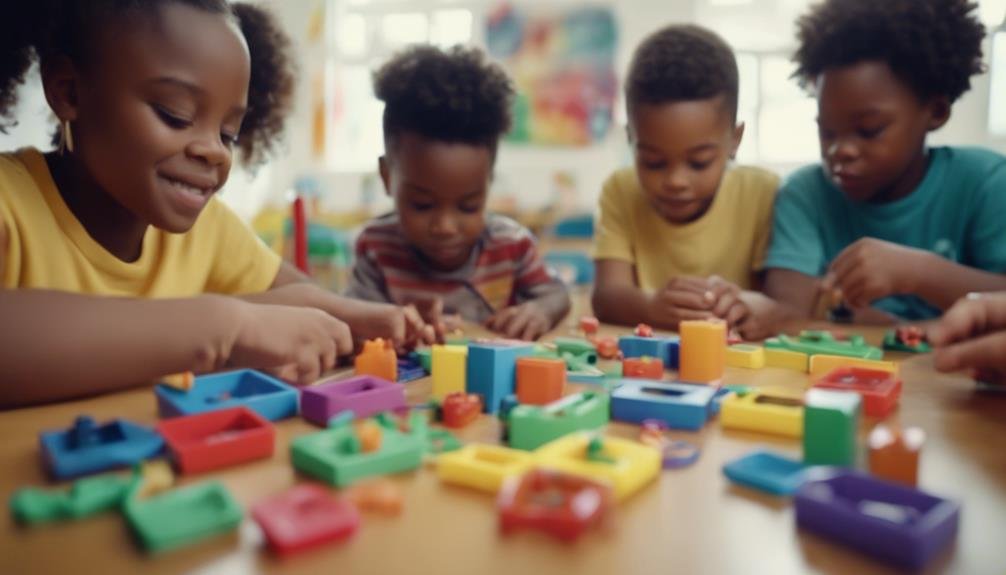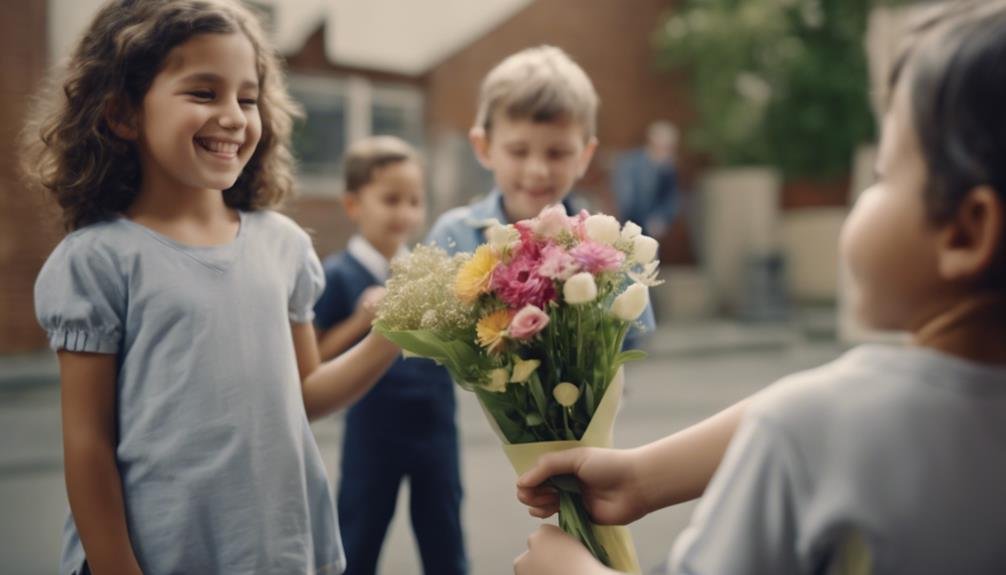Early Childhood Education: Why It's Essential and How to Get Started
Imagine early childhood education as the foundation of a sturdy building. Just as a strong foundation is critical for a building's stability, the early years of a child's education play an important role in their overall development.
But why is it so essential, and how can you guarantee your child gets off to the right start?
Let's uncover the significance of early childhood education and explore practical steps to kickstart your child's educational journey.
Key Takeaways
- Early childhood education builds the foundation for lifelong learning and academic success.
- Parental involvement and structured learning enhance social and cognitive skills.
- Monitoring developmental milestones aids in understanding and supporting a child's growth.
- Play-based activities foster creativity, problem-solving, and essential social skills in early education.
Importance of Early Education

Understanding the significance of early education can lay the foundation for a child's lifelong learning journey. Parent involvement is key during these formative years, as it can greatly impact a child's school readiness. By actively participating in your child's educational journey, you demonstrate the value of learning and set the stage for their future academic success.
Early education plays an essential role in fostering cognitive development. Young minds are like sponges, enthusiastic to soak up knowledge and new experiences. Through structured learning activities and play, children can enhance their problem-solving skills, critical thinking abilities, and overall mental acuity.
Additionally, social skills are honed during early education experiences. Interacting with peers and teachers helps children learn how to communicate effectively, resolve conflicts, and work cooperatively. These essential social skills are the building blocks for forming positive relationships and circumnavigating the complexities of the world around them. By recognizing the importance of early education, you're investing in your child's future success both academically and socially.
Benefits of Starting Early
To set your child up for lasting success, consider the numerous advantages of getting an early start on their educational journey. Starting early offers significant benefits for your child's cognitive development. Early childhood education programs are designed to stimulate young minds, fostering skills like problem-solving, critical thinking, and language acquisition from the very beginning. By engaging in structured learning activities at a young age, children develop a strong foundation that sets them up for academic success in the future.
Additionally, beginning early also enhances your child's social skills. Interacting with peers and educators in a structured environment helps children learn important social cues, develop empathy, and build communication skills. These early interactions form the basis for healthy relationships and effective collaboration later in life.
Developmental Milestones in Early Years
Exploring the developmental milestones in early years can provide valuable insights into your child's growth and progress. Understanding these key markers in cognitive development, social skills, language acquisition, and motor skills can help you support your child's development effectively. Below is a table summarizing some typical milestones to look out for in each area:
| Milestone | Cognitive Development | Social Skills | Language Acquisition | Motor Skills |
|---|---|---|---|---|
| 0-6 months | Begins to recognize faces | Smiles and coos | Makes babbling sounds | Begins to grasp objects |
| 6-12 months | Explores objects with hands | Shows interest in others | Says simple words like "mama" or "dada" | Starts crawling |
| 1-2 years | Engages in pretend play | Shows some independence | Vocabulary of 50+ words | Walks independently |
| 2-3 years | Sorts shapes and colors | Plays with other children | Forms short sentences | Runs and climbs |
| 3-4 years | Understands basic concepts | Takes turns in games | Asks many "why" questions | Hops on one foot |
Monitoring these milestones can give you a better understanding of your child's development and help identify any areas where they may need extra support.
Choosing the Right Early Education Program
Selecting the right early education program for your child is an important decision that can greatly impact their future development and learning experiences. When it comes to program selection, consider the curriculum alignment with your child's needs and interests. Look for programs that offer a well-rounded curriculum focusing on academics, social skills, and emotional development. Parent involvement is key in supporting your child's learning journey. Choose a program that encourages parental engagement through regular updates, meetings, and opportunities to participate in classroom activities.
Additionally, explore community resources that can complement your child's early education. Seek programs that collaborate with local libraries, museums, or community centers to provide enriching experiences beyond the classroom. These resources can enhance your child's learning and expose them to a variety of educational opportunities.
Creating a Learning-Friendly Environment at Home

When setting up your home environment for learning, consider incorporating elements that foster curiosity and exploration, encouraging your child's natural inclination to discover and learn. Create designated learning spaces within your home where your child can engage in various activities. These areas could include a cozy reading nook with a selection of age-appropriate books, a craft corner stocked with art supplies, or a mini science station for hands-on experiments. By having these spaces readily available, you make it easier for your child to shift into learning mode.
Incorporate home activities that blend fun and education. Simple activities like baking together can teach math concepts through measuring ingredients, while nature walks in the backyard can spark an interest in science and the environment. Encourage your child to ask questions and explore their surroundings actively.
Incorporating Play-Based Learning
To enhance your child's learning experience, incorporate play-based activities that are both educational and enjoyable. Play-based learning is a fantastic way for children to explore their creativity while also fostering essential social skills. Through play, children can develop problem-solving abilities, enhance their imagination, and learn how to interact with others effectively.
Consider engaging your child in activities that promote different types of play. Here's a table to give you some ideas:
| Type of Play | Description |
|---|---|
| Imaginative Play | Encourages creativity and role-playing |
| Constructive Play | Enhances problem-solving skills |
| Cooperative Play | Fosters social skills and teamwork |
Building a Strong Partnership With Educators

Strengthen your child's educational journey by fostering a collaborative and supportive relationship with their educators. Building a strong partnership with teachers is essential for your child's growth and development. Here are some tips to enhance your connection with educators:
- Regular Communication: Establish open lines of communication with teachers to stay informed about your child's progress and any concerns that may arise.
- Building Trust: Trust is the foundation of a strong partnership. Show respect and trust in your child's educators, and they'll reciprocate.
- Setting Shared Goals: Work together with teachers to set goals for your child's learning and development. Aligning on objectives creates a united front.
- Utilizing Collaboration Techniques: Embrace collaborative techniques such as parent-teacher conferences, workshops, and volunteering opportunities to actively engage in your child's educational journey.
Monitoring Your Child's Progress
To effectively monitor your child's progress in early childhood education, track their milestones and achievements regularly. By tracking their development and guaranteeing they are on the right path for success. Here is a simple table to help you keep track of your child's progress:
| Development Area | Goals |
|---|---|
| Cognitive Skills | Recognize colors and shapes by age 3 |
| Social Skills | Share toys and take turns by age 4 |
| Language Development | Form simple sentences by age 2 |
| Motor Skills | Hold a pencil correctly by age 5 |
Frequently Asked Questions
How Can Parents Support Their Child's Social and Emotional Development During Early Childhood Education?
To support your child's social and emotional growth, be actively involved in their life. Encourage playtime for developing social skills. Prioritize emotional well-being by listening and validating their feelings. Consider play therapy if needed for a more structured approach.
What Role Does Nutrition Play in a Child's Learning and Development During Early Education?
Fueling your child's body with nutritious foods is like providing premium gas for a car – it helps their brain function at its best. Good nutrition impacts learning and development by boosting focus, memory, and overall cognitive abilities.
Are There Any Specific Resources or Tools Available to Help Parents Navigate the Early Education System?
To help you navigate early education, consider attending parent workshops and joining online forums for support. Explore community resources and educational apps that can enrich your child's learning journey. Stay connected and informed!
How Can Parents Address Any Potential Learning Challenges or Delays That May Arise During Early Childhood Education?
Feeling concerned about potential learning challenges or delays in your child's early education? Wondering how to support them effectively? Stay proactive by seeking guidance from educators, utilizing intervention strategies, and tapping into parenting resources for developmental support.
What Are Some Ways to Incorporate Cultural Diversity and Inclusivity Into Early Education Programs?
To infuse cultural celebrations into early education, include diverse books, music, and activities. Validate an inclusive curriculum by highlighting various traditions, languages, and holidays. Embrace diversity, fostering a sense of belonging and understanding in children.
Conclusion
Now that you've learned the importance of early childhood education, it's time to take the next step in your child's development journey.
By starting early, you're setting them up for success in school and beyond. Remember to create a nurturing learning environment at home, engage in play-based learning, and collaborate with educators to monitor progress.
With these tools in hand, you can give your child the best possible start in life. Keep up the great work!








